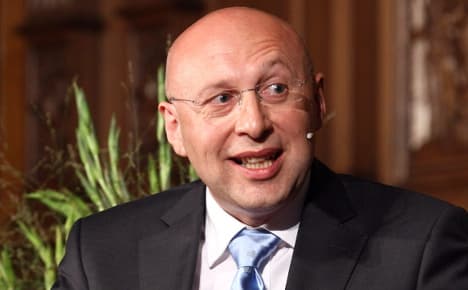German scientist wins Nobel Chemistry Prize

UPDATE: German scientist Stefan Hell and two Americans have won the Nobel Prize for Chemistry for advancing the microscope, the Royal Swedish Academy of Sciences announced on Wednesday.
Hell, a German citizen, won the prize alongside Eric Betzig and William Moerner "for the development of super-resolved fluorescence microscopy".
Working separately from Betzig and Moerner, who worked together, Hell discovered a way to surpass the current limitations of the light microscope to create a new way of looking at cells and bringing microscopy into the nanoworld.
Until their research, optical microscopy was held back by the limitation that it would never obtain a better resolution than half the wavelength of light.
But using fluorescent molecules, the prize winners overcame this limitation, bringing optical microscopy down to the nanoscale.
It means that scientists can track tiny molecules inside living cells which they could not do before.
They can see how proteins in Parkinson's, Alzheimer's, and Huntington's disease move and can even track individual proteins as the cells divide inside embryos.
In 2000, Hell developed a method called stimulated emission depletion (STED) microscopy which uses two laser beams.
One laser beam makes fluorescent molecules glow and the other beam cancels out all fluorescence apart from a nano amount.
By scanning over the sample nanometre by nanometre an image is created far greater than with a light microscope.
The Nobel’s GPS may be predisposed to find its way to the U.S. (http://t.co/QWoY0ZTcKn) pic.twitter.com/gGCpZ6in8w
— Thomson Reuters (@thomsonreuters) October 7, 2014
Announcing the award, The Royal Swedish Academy of Sciences said: "Today, nanoscopy is used worldwide and new knowledge of greatest benefit to mankind is produced on a daily basis."
Hell, who was born in Romania, got his PhD in 1990 from the University of Heidelberg and is now a director at the Max Planck Institute for Biophysical Chemistry in Göttingen.
The 51-year-old is also division head of the German Cancer Research Center in Heidelberg.
The prize money of 8 million SEK (€900,000) will be shared equally between the three.
German Stefan W. Hell, 1/3 #nobelprize2014 in Chemistry pic.twitter.com/QdR9MCW3Bs
— The Nobel Prize (@NobelPrize) October 8, 2014
Comments
See Also
Hell, a German citizen, won the prize alongside Eric Betzig and William Moerner "for the development of super-resolved fluorescence microscopy".
Working separately from Betzig and Moerner, who worked together, Hell discovered a way to surpass the current limitations of the light microscope to create a new way of looking at cells and bringing microscopy into the nanoworld.
Until their research, optical microscopy was held back by the limitation that it would never obtain a better resolution than half the wavelength of light.
But using fluorescent molecules, the prize winners overcame this limitation, bringing optical microscopy down to the nanoscale.
It means that scientists can track tiny molecules inside living cells which they could not do before.
They can see how proteins in Parkinson's, Alzheimer's, and Huntington's disease move and can even track individual proteins as the cells divide inside embryos.
In 2000, Hell developed a method called stimulated emission depletion (STED) microscopy which uses two laser beams.
One laser beam makes fluorescent molecules glow and the other beam cancels out all fluorescence apart from a nano amount.
By scanning over the sample nanometre by nanometre an image is created far greater than with a light microscope.
The Nobel’s GPS may be predisposed to find its way to the U.S. (http://t.co/QWoY0ZTcKn) pic.twitter.com/gGCpZ6in8w
— Thomson Reuters (@thomsonreuters) October 7, 2014 Announcing the award, The Royal Swedish Academy of Sciences said: "Today, nanoscopy is used worldwide and new knowledge of greatest benefit to mankind is produced on a daily basis."
Hell, who was born in Romania, got his PhD in 1990 from the University of Heidelberg and is now a director at the Max Planck Institute for Biophysical Chemistry in Göttingen.
The 51-year-old is also division head of the German Cancer Research Center in Heidelberg.
The prize money of 8 million SEK (€900,000) will be shared equally between the three.
German Stefan W. Hell, 1/3 #nobelprize2014 in Chemistry pic.twitter.com/QdR9MCW3Bs
— The Nobel Prize (@NobelPrize) October 8, 2014
Join the conversation in our comments section below. Share your own views and experience and if you have a question or suggestion for our journalists then email us at [email protected].
Please keep comments civil, constructive and on topic – and make sure to read our terms of use before getting involved.
Please log in here to leave a comment.